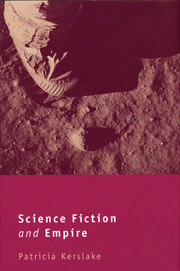Book contents
- Frontmatter
- Contents
- Introduction
- 1 The Self and Representations of the Other in Science Fiction
- 2 Resistance Is Futile: Silencing and Cultural Appropriation
- 3 The Word for World Is Forest: Metaphor and Empire in Science Fiction
- 4 Things Fall Apart: Relativity, Distance and the Periphery
- 5 Moments of Empire: Perceptions of Lasswitz and Wells
- 6 Exoticising the Future: American Greats
- 7 The Shape of Things to Come: Homo futuris and the Imperial Project
- 8 A Postcolonial Imagination: Kim Stanley Robinson's Mars
- 9 Beyond Empire: Meta-empire and Postcoloniality
- Conclusion
- Notes
- Bibliography
- Index
2 - Resistance Is Futile: Silencing and Cultural Appropriation
- Frontmatter
- Contents
- Introduction
- 1 The Self and Representations of the Other in Science Fiction
- 2 Resistance Is Futile: Silencing and Cultural Appropriation
- 3 The Word for World Is Forest: Metaphor and Empire in Science Fiction
- 4 Things Fall Apart: Relativity, Distance and the Periphery
- 5 Moments of Empire: Perceptions of Lasswitz and Wells
- 6 Exoticising the Future: American Greats
- 7 The Shape of Things to Come: Homo futuris and the Imperial Project
- 8 A Postcolonial Imagination: Kim Stanley Robinson's Mars
- 9 Beyond Empire: Meta-empire and Postcoloniality
- Conclusion
- Notes
- Bibliography
- Index
Summary
Before we examine specific treatments of the Other, it is valuable first to consider certain influences upon and within SF. To what degree is the genre intertextual within itself? That is, do narratives often borrow or assume various devices common within SF sub-genres? How important is a rational extrapolation that permits the reader to judge a narrative's plausibility? The isolated narrative which creates completely new worlds, new cultures and even new life forms offers only a single interpretation to the reader, yet, through intertextuality or, as Damien Broderick suggests, self-referentiality via a ‘mega-text’, a greater range of explanations may be discerned. If there are no alternatives or subtexts to the narrative, no additional means by which the author/reader partnership may expand, the reader must accept the narrative and ideas of the author without recourse to the outside world. This in itself is a form of restraint, a silencing. In SF, these restraints may be deliberately imposed, in order to guide the reader in a specific direction, enabling the text to explore without hindrance both the vast possibilities of the totally alien and the microscopic detail of the slightly known, as in the works of Iain M. Banks. Alternatively, an SF text which embraces earlier works, such as the recursive SF of Brian Aldiss's Frankenstein Unbound (1973) or David Dvorkin's Time for Sherlock Holmes (1983), immediately widens the net of association, from which the reader may gather far more insight than solely from the text contained within the book's covers.
- Type
- Chapter
- Information
- Science Fiction and Empire , pp. 25 - 42Publisher: Liverpool University PressPrint publication year: 2010



